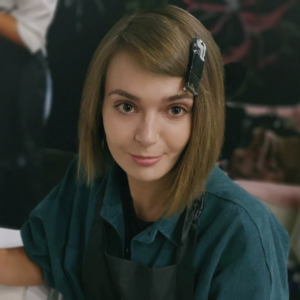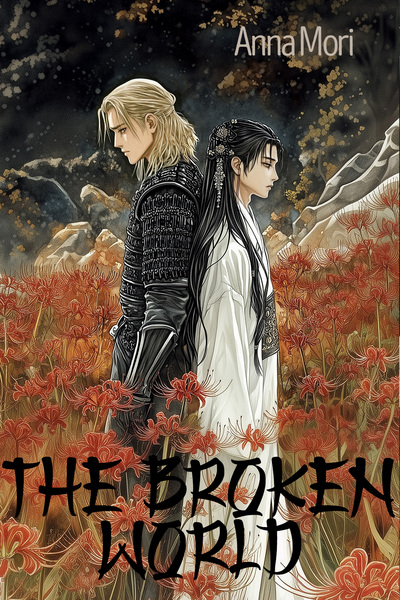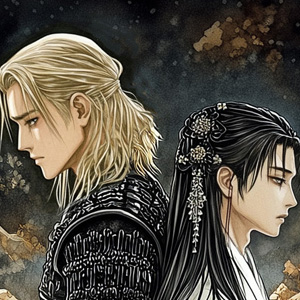No man is an island, entire of itself; every man is a piece of the continent, a part of the main.
—John Donne
Why should a man be scorned, if, finding himself in prison, he tries to get out and go home? Or if, when he cannot do so, he thinks and talks about other topics than jailers and prison-walls? The world outside has not become less real because the prisoner cannot see it…
—J.R.R. Tolkien, On Fairy Stories
The first people emerged from the grasses of the Endless Steppe, in the South, at the edge of the world.
They did not know where they had come from or what their purpose in this world might be. They clung to each other, trembling with cold and fear.
And then four gods appeared to them.
The first was the Black Tortoise. She dreamed of a land ruled by wisdom and law. She led those who shared her vision to the North — those whose minds shone with clarity.
The second was the Azure Dragon. He called to the souls who longed for beauty, and they followed him East.
The White Tiger found kinship with the strong and the brave, those unafraid of hardship. They traveled West to build a nation of their own.
The Golden Phoenix was the last to arrive. She gazed upon those who remained, and her heart was filled with pity. She stayed with them in the South, bringing magic and wonder into their lives.
Since then, the Four have argued endlessly about who chose the best path. They favor mortals, granting extraordinary gifts to their chosen ones — wise rulers, powerful sorcerers, great generals. But the quarrels of the Four never cease, and so the Middle Kingdoms are doomed to perpetual strife.
Or so the story goes.
Prologue: The Madman
Yukinari would never forget the day his dragon appeared. (He never gave it another name — just “dragon.” The dragon insisted names were for humans.)
Some part of Yukinari’s mind understood, of course, that dragons weren’t real and that something was deeply wrong with him. But another part of him whispered otherwise. His thoughts were too tangled to separate reality from imagination — though this had been true long before the dragon came.
Sometimes, he thought the dragon might be part of himself, a fragment of his personality. But the more he pondered it, the more he was convinced that this only proved its reality: if he stopped believing in the dragon, he would stop believing in himself. And then what would be left?
In fact, with the dragon’s arrival, his mind had grown sharper, the world around him more vivid. Until then, reality had always seemed muted, like living in the hazy blue-gray twilight before dawn. But now the sun had risen, and the fog had lifted.
The fog had begun to gather in his mind when he was just a child, back in Baijing, the capital of Yuigui.
It had started gradually.
He had been a quiet, dreamy child, content without friends — until the day he realized he wanted them. And when he reached out, he made a painful discovery: the other children at court wanted nothing to do with him.
Their aversion wasn’t overtly hostile. Once, someone tripped him, and he fell — but it didn’t hurt much, and the boy responsible was scolded harshly, so it never happened again. They didn’t mock him, nor did they gossip about him — though children will find a reason to mock anything.
They simply avoided him.
He spent a long time not understanding why. His mother would insist it was because of his father. Yuki wasn’t entirely convinced. He had seen how the other court ladies avoided his mother, which meant people didn’t like her either. That, however, wasn’t surprising to him — he feared his mother, and she hated him as fiercely as she hated everything connected to the man she’d been forced to marry against her will.
His mother, Sun Xiaolian, had been a court lady in service to the aging but powerful Empress Yui Liang. His father... his father, Yukihito, was a foreigner to this land — the crown prince of Ryukoku, the Dragon Kingdom, sworn enemy of Yuigui. He lived at the Yuigui court as a hostage, treated with the courtesy owed to an honored guest, though he could not leave the country, even if he had wanted to.
And of course, he wanted to. Yukihito despised Yuigui. He often told Yuki and his brother about his homeland — the Dragon Kingdom. A land where the sun rises, a place of elegant, melancholy beauty, defeated in war but unbroken in spirit. "The defeated are always nobler than the victors," their father liked to say. According to him, someday they would return there, and everything would finally be set right. He would take his place on the throne of his father — Yuki’s grandfather — and Yuki and his brother, Yukiyoshi, would be honored as princes, the bloodline of the Azure Dragon. Their mother had no place in these fantasies. Yukihito hated Lady Sun Xiaolian as much as she loathed him.
Listening to his father’s stories, Yuki became enamored with the Dragon Kingdom, too. He knew almost nothing about the real Ryukoku, so he had no choice but to invent it for himself. In moments of loneliness and anger, he commanded his thoughts to dwell on a world where everything was different — as it should be. This was not new for him; the first such world had appeared to him at the age of five, and by the time he became captivated by Ryukoku, the worlds he had imagined numbered in the dozens. But this time, he knew it wasn’t just another childish fantasy. It was real — the only real thing.
He spent hours on his imagined Ryukoku, painstakingly creating its details: its customs, laws, cities, gods, people’s clothing, the trees that grew there, the magical creatures that roamed its lands. His Ryukoku wasn’t just home to dragons — there were unicorn-like qilin, sophisticated multi-tailed foxes, and giant talking birds — but it was the dragons he drew most often. Vibrant creatures brimming with life and color, with long crimson whiskers, eyes more dazzling than amethysts or sapphires, and radiant manes that either flared like tongues of fire or flowed like streams of water.
At night, he dreamed of climbing onto the cool, scaled backs of dragons as they carried him over the sea (he’d dreamed of seeing the sea ever since he’d learned it existed), across mountains, and above an elegant, unfamiliar city — the capital of Ryukoku.
Yukinari began to feel that his life in Yuigui — his fractured, hate-riddled family, his loneliness — was all temporary, a layover spent waiting for a grand journey. That journey, of course, would be his return to the Dragon Kingdom. His imagined Ryukoku became the home he lacked. He even set a specific age for his departure: eleven. When he first started envisioning Ryukoku, eleven felt impossibly distant.
Almost as often as he drew dragons, he sketched the people he imagined waiting for him there — future friends who, he believed, were eager to meet him. At first, there were only a few: his best friend, the girl who would become his wife when they grew up, and a younger sister. He gave them strange, beautiful names in a language that didn’t exist.
Yuki knew Ryukokuan (the language of the real Ryukoku); his father stubbornly spoke only his native tongue with his sons, while everyone else addressed Yuki in the tongue of Yuigui. Both languages had been familiar to him from a young age. But in his imagined Dragon Kingdom, they spoke a different language, and Yuki delighted in creating its characters and sounds.
The beloved sister who waited for him in Ryukoku bore no resemblance to his infant sibling, Mayumi. His brother, Yukiyoshi, also had no place in Ryukoku. Somehow, this didn’t strike him as a contradiction. Neither his parents, his brother, nor the children who quietly despised him at court had any place in his perfect universe.
Strangely, though, when he tried to picture his best friend, his mind conjured an image of a boy he vaguely recognized — one of the children he longed to befriend but had given up on approaching. The boy was clever, quiet, and graceful, with serious, wide-set brows. There was something in his demeanor that matched the friend Yuki envisioned in Ryukoku, though he barely knew him and had no desire to get closer.
Perhaps Yuki’s thoughts were already muddled even then, for it never occurred to him to try genuinely befriending any of the children around him. He didn’t even single anyone out — they were, to him, a collective being, unkind yet alluring. He dreamed of friendship as an abstract concept, even as his solitude gnawed at him daily. It never dawned on him that friendship required effort. He didn’t know how to show interest in these children, nor did he understand that he needed to. Instead, he performed little rituals. “If I step across the courtyard without touching a crack, I’ll make a friend.” “If I brush the edge of his sleeve, he’ll speak to me,” he would vow.
These rituals only served to cement his status as not just an outcast ("This is the son of You-Know-Who; don't look at him") to the son of You-Know-Who who is not quite right in the head.
Yukinari was vaguely aware that his behavior was strange, yet the rituals made sense to him. He felt that something was wrong but couldn’t figure out what the right actions would be. His thoughts grew harder to untangle.
Oddly enough, he excelled in his studies, and his tutors adored him. He retained characters, historical dates, and poetic verses with ease. These things, unlike the hostile world of people, were simple and logical.
He read books far too advanced for his age. At ten, he asked for a textbook on Old Yuiguian as a gift.
Yet in many ways, he remained a child. He continued to build his Dragon Kingdom, a world brighter and more real to him than the reality surrounding him. It was, in essence, all he had, and he clung to it desperately.
His isolation thickened daily, a fog that seemed to solidify around him, until he stopped trying to connect with others. He spoke little to his parents and brother, buried himself in books, and occasionally played the Yuigui board game "Mist and Clouds" alone, inventing strategies. Often, he wandered for hours, lost in thought, only to realize later that he couldn’t recall where he had been or what he had thought about. At times, he wasn’t even sure if he truly existed.
Shortly after he turned eleven, his father died. He never learned exactly how. They told him it was a weak heart. It could have been poison, but his father — a weak, ineffective man far removed from politics — was unlikely to have been a threat to anyone.
What troubled Yuki most was how little his father’s death upset him. He had never been particularly close to him, but he thought he should have felt something. Instead, he began to doubt the reality of his own existence. He had long felt insubstantial, pale, and thin. At times, it seemed as though others lived while he merely existed — a cold, hollow, two-dimensional creature, like a poorly conceived character by an indecisive author unsure whether to erase, reshape, or leave them as they were.
On the day of his father’s death, this sense of unreality overwhelmed him. He imagined himself as a fragile, colorless thing, like a dried butterfly, ready to crumble into dust. Terrified, he broke a cup and ran the shard across his wrist, finding comfort in the sight of his own blood — bright, alive, and undeniably real.
When they found him — huddled in a corner, still scratching his arm with the broken shard — they surrounded him with care and concern, believing he was overcome with grief over his father’s death. He tried to explain why he had done it, but no one understood. They thought he had tried to end his life.
Yuki often thought of death, but he had never truly wanted to die. Some force — perhaps the Great Dragon his family claimed as their ancestor — had instilled in him a profound, innate love for life. Yet, cruelly, it had failed to give him the strength to live it fully. He simply wanted to know if he was real. That was all. His father’s death had nothing to do with it.
After his father’s death, their family’s position at court weakened even further. But Lady Sun Xiaolian still had a few useful connections. Faced with a choice between living as a pariah — or perhaps a prisoner — at the Yuigui court or fleeing to her husband’s despised homeland, she chose the latter. She, like her sons, knew almost nothing about Ryukoku and clung to fragile hope.
One night, under the cover of darkness, Yuki, his mother, his brother, his tiny sister, and a few loyal retainers slipped out of the palace, climbed into a carriage, and left Baijing. They were pursued, but not for long. Yuigui, at the height of its power, paid little attention to the escape of the family of a Ryukoku prince-hostage. Ryukoku lay in ruins after the war, after all.
They arrived safely in Ryukoku — the real Dragon Kingdom, not the one Yuki had imagined. They had returned home.
But somehow, nothing in Yuki’s life changed.
They were received with pomp, the people rejoicing in the salvation of the heirs to the throne after years of captivity. Yet, there was an undercurrent of wariness — how could anyone ignore that the children of Prince Yukihito had been born and raised in a hostile land, absorbing its language and culture? In truth, they were as foreign here as they had been in Yuigui.
The real Ryukoku turned out to be nothing like the Dragon Kingdom of Yukinari’s imagination. From his father’s stories, he had thought he knew Shinju, the capital — a city as beautiful as a pearl of the sea, with canals and bridges instead of streets, boats and ships instead of carriages. He had envisioned something romantic. But real Shinju, perpetually shrouded in rain or fog, was a dark, oppressive place. It smelled of damp cold, rotting nets and pilings, fish. The houses were shabby, and the people in the streets looked impoverished. Unbidden, he compared it to the Baijing they had left behind, the capital of Yuigui, and his heart sank. His new home, with all its strange, sickly beauty, was utterly unsuited for life.
A few times, he caught himself saying, “Back home, it was different...” meaning Yuigui, of course — a sentiment that hardly endeared him to anyone in Ryukoku.
Only the sea surpassed his expectations. Infinite, boundless, it surged against the shore, never freezing in winter. Winters here were milder than in Yuigui, almost snowless, with plum blossoms appearing as early as February.











Comments (0)
See all